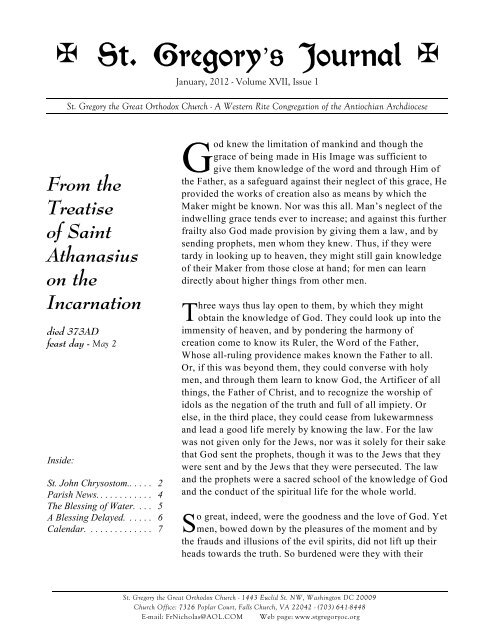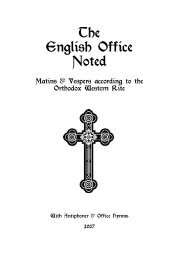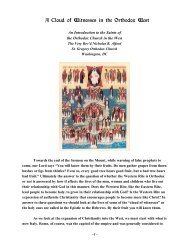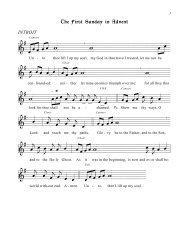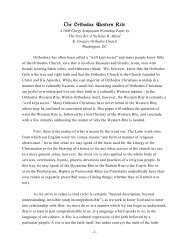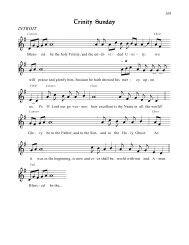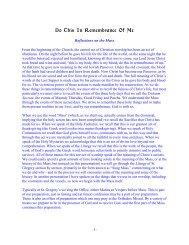January 2012 - St. Gregory the Great Orthodox Church
January 2012 - St. Gregory the Great Orthodox Church
January 2012 - St. Gregory the Great Orthodox Church
You also want an ePaper? Increase the reach of your titles
YUMPU automatically turns print PDFs into web optimized ePapers that Google loves.
<strong>St</strong>. <strong>Gregory</strong>’s Journal <br />
<strong>January</strong>, <strong>2012</strong> - Volume XVII, Issue 1<br />
<strong>St</strong>. <strong>Gregory</strong> <strong>the</strong> <strong>Great</strong> <strong>Orthodox</strong> <strong>Church</strong> - A Western Rite Congregation of <strong>the</strong> Antiochian Archdiocese<br />
From <strong>the</strong><br />
Treatise<br />
of Saint<br />
Athanasius<br />
on <strong>the</strong><br />
Incarnation<br />
died 373AD<br />
feast day - May 2<br />
Inside:<br />
<strong>St</strong>. John Chrysostom.. . . . . 2<br />
Parish News. . . . . . . . . . . . 4<br />
The Blessing of Water. . . . 5<br />
A Blessing Delayed. . . . . . 6<br />
Calendar. . . . . . . . . . . . . . 7<br />
God knew <strong>the</strong> limitation of mankind and though <strong>the</strong><br />
grace of being made in His Image was sufficient to<br />
give <strong>the</strong>m knowledge of <strong>the</strong> word and through Him of<br />
<strong>the</strong> Fa<strong>the</strong>r, as a safeguard against <strong>the</strong>ir neglect of this grace, He<br />
provided <strong>the</strong> works of creation also as means by which <strong>the</strong><br />
Maker might be known. Nor was this all. Man’s neglect of <strong>the</strong><br />
indwelling grace tends ever to increase; and against this fur<strong>the</strong>r<br />
frailty also God made provision by giving <strong>the</strong>m a law, and by<br />
sending prophets, men whom <strong>the</strong>y knew. Thus, if <strong>the</strong>y were<br />
tardy in looking up to heaven, <strong>the</strong>y might still gain knowledge<br />
of <strong>the</strong>ir Maker from those close at hand; for men can learn<br />
directly about higher things from o<strong>the</strong>r men.<br />
Three ways thus lay open to <strong>the</strong>m, by which <strong>the</strong>y might<br />
obtain <strong>the</strong> knowledge of God. They could look up into <strong>the</strong><br />
immensity of heaven, and by pondering <strong>the</strong> harmony of<br />
creation come to know its Ruler, <strong>the</strong> Word of <strong>the</strong> Fa<strong>the</strong>r,<br />
Whose all-ruling providence makes known <strong>the</strong> Fa<strong>the</strong>r to all.<br />
Or, if this was beyond <strong>the</strong>m, <strong>the</strong>y could converse with holy<br />
men, and through <strong>the</strong>m learn to know God, <strong>the</strong> Artificer of all<br />
things, <strong>the</strong> Fa<strong>the</strong>r of Christ, and to recognize <strong>the</strong> worship of<br />
idols as <strong>the</strong> negation of <strong>the</strong> truth and full of all impiety. Or<br />
else, in <strong>the</strong> third place, <strong>the</strong>y could cease from lukewarmness<br />
and lead a good life merely by knowing <strong>the</strong> law. For <strong>the</strong> law<br />
was not given only for <strong>the</strong> Jews, nor was it solely for <strong>the</strong>ir sake<br />
that God sent <strong>the</strong> prophets, though it was to <strong>the</strong> Jews that <strong>the</strong>y<br />
were sent and by <strong>the</strong> Jews that <strong>the</strong>y were persecuted. The law<br />
and <strong>the</strong> prophets were a sacred school of <strong>the</strong> knowledge of God<br />
and <strong>the</strong> conduct of <strong>the</strong> spiritual life for <strong>the</strong> whole world.<br />
S<br />
o great, indeed, were <strong>the</strong> goodness and <strong>the</strong> love of God. Yet<br />
men, bowed down by <strong>the</strong> pleasures of <strong>the</strong> moment and by<br />
<strong>the</strong> frauds and illusions of <strong>the</strong> evil spirits, did not lift up <strong>the</strong>ir<br />
heads towards <strong>the</strong> truth. So burdened were <strong>the</strong>y with <strong>the</strong>ir<br />
<strong>St</strong>. <strong>Gregory</strong> <strong>the</strong> <strong>Great</strong> <strong>Orthodox</strong> <strong>Church</strong> - 1443 Euclid <strong>St</strong>. NW, Washington DC 20009<br />
<strong>Church</strong> Office: 7326 Poplar Court, Falls <strong>Church</strong>, VA 22042 - (703) 641-8448<br />
E-mail: FrNicholas@AOL.COM Web page: www.stgregoryoc.org
wickednesses that <strong>the</strong>y seemed ra<strong>the</strong>r to be brute beasts ra<strong>the</strong>r than<br />
reasonable men, reflecting <strong>the</strong> very Likeness of <strong>the</strong> Word.<br />
What was God to do? What else could He possibly do, being<br />
God, but renew His Image in mankind, so that through it men<br />
might once more come to know Him? And how could this be done<br />
save by <strong>the</strong> coming of <strong>the</strong> very Image Himself, our Savior Jesus<br />
Christ? Men could not have done it, for <strong>the</strong>y are only made after <strong>the</strong><br />
Image; nor could angels have done it, for <strong>the</strong>y are not <strong>the</strong> images of<br />
God. The Word of God came in His own Person, because it was he<br />
alone, <strong>the</strong> Image of <strong>the</strong> Fa<strong>the</strong>r, Who could recreate man made after<br />
<strong>the</strong> Image.<br />
<strong>St</strong>. John Chrysostom<br />
Feast day ~ <strong>January</strong> 27<br />
Popularity with many often brings about hatred by some, and<br />
truth, spoken forthrightly and bluntly can inspire hatred in those<br />
for whom <strong>the</strong> truth hurts most. <strong>St</strong>. John Chrysostom, Patriarch of<br />
th<br />
th<br />
Constantinople at <strong>the</strong> turn of <strong>the</strong> 4 to <strong>the</strong> 5 century, experienced<br />
this phenomenon dramatically.<br />
John was born in Antioch around <strong>the</strong> year 344, little more than 30<br />
years after Emperor Constantine had given Christianity a legal<br />
status in <strong>the</strong> Roman Empire. The young man’s education was<br />
directed toward a career as a lawyer and he showed remarkable<br />
talent as an orator.<br />
John’s parents became Christians and, at <strong>the</strong> age of 23, John also<br />
was baptized and <strong>the</strong> direction of his life was forever changed.<br />
Recognizing <strong>the</strong> seriousness of <strong>the</strong> commitment required of a<br />
Christian, John decided to live as a monk, eventually forming a<br />
monastery as he was joined by o<strong>the</strong>rs. He was beloved by his<br />
fellow monks and became an example to all, both in <strong>the</strong> monastery<br />
and in <strong>the</strong> city of Antioch, for his godly life.<br />
Desiring to become closer to God, John left <strong>the</strong> monastery and<br />
went fur<strong>the</strong>r into <strong>the</strong> wilderness to be a hermit. However,<br />
illness forced him to return to Antioch for medical care, and <strong>the</strong>re<br />
Patriarch Meletios (who had baptized him) tonsured John as a<br />
Reader in <strong>the</strong> <strong>Church</strong>. Some time later, John was ordained a<br />
Deacon and after five years of diaconal service, he felt called to<br />
return to his monastery.<br />
2
Patriarch Meletios traveled to Constantinople to attend <strong>the</strong><br />
Second Ecumenical Council and while <strong>the</strong>re, reposed in <strong>the</strong><br />
Lord. His successor in Antioch was Flavianos, who had a dream in<br />
which he was told that he should ordain John to <strong>the</strong> priesthood and<br />
bring him back to <strong>the</strong> city. Taking <strong>the</strong> dream seriously, Flavianos<br />
went to <strong>the</strong> monastery, where he found that John had had a similar<br />
dream. The Patriarch had to console <strong>the</strong> monks, as <strong>the</strong>y were not<br />
happy to lose <strong>the</strong>ir beloved John. When <strong>the</strong> two arrived in <strong>the</strong> city,<br />
crowds of people ga<strong>the</strong>red to rejoice that <strong>the</strong> now famous monk had<br />
come back to <strong>the</strong>m.<br />
John was especially popular for his preaching. His early oratorical<br />
skills had been put to good use in explaining <strong>the</strong> teachings of <strong>the</strong><br />
<strong>Church</strong> and in stirring <strong>the</strong> hearts of <strong>the</strong> people to greater zeal. He<br />
was given <strong>the</strong> nick-name “Chrysostom”, meaning “golden<br />
mou<strong>the</strong>d”, because of <strong>the</strong> beauty of his words. These beautiful<br />
words were often directed toward those who followed false<br />
teachings.<br />
When Nectarios, <strong>the</strong> Patriarch of Constantinople died near <strong>the</strong><br />
end of <strong>the</strong> century, John was elected to succeed him. But <strong>the</strong><br />
humble priest-monk did not believe himself worthy of so exalted a<br />
position and <strong>the</strong> near-riot that ensued showed that <strong>the</strong> people of<br />
Antioch were certainly not willing to give up <strong>the</strong>ir beloved<br />
preacher.<br />
So John had to be taken away from Antioch with “cloak and<br />
dagger” tactics. An anonymous note was sent to him requesting<br />
that he come to a church outside <strong>the</strong> city to meet with someone who<br />
needed his help. When he arrived, a coach was waiting and soldiers<br />
placed him in <strong>the</strong> carriage and whisked him away from Antioch.<br />
When <strong>the</strong>y arrived in Constantinople, a huge crowd of people<br />
greeted John’s arrival with great joy. John was ordained Patriarch of<br />
Constantinople on December 15, 398 and now <strong>the</strong> most important<br />
work that God had for him began.<br />
<strong>St</strong>. John experienced adulation from most of <strong>the</strong> Christians of<br />
Constantinople and beyond. People flocked to hear him preach<br />
and teach and <strong>the</strong>y frequently reacted to his sermons by applauding,<br />
a practice which John put a stop to. We are privileged to have many<br />
of <strong>the</strong>se sermons in written form for our instruction now. The most<br />
famous one is <strong>the</strong> Paschal sermon which we hear every year at <strong>the</strong><br />
Easter Vigil.<br />
But many in <strong>the</strong> capital city of <strong>the</strong> Empire were still pagans,<br />
pseudo-Christianity abounded, and <strong>the</strong> Arian heresy was<br />
growing. The level of morality was very low. The new Patriarch’s<br />
sermons, while loved by <strong>the</strong> faithful Christians, were too<br />
3
uncomfortable for some. When it was obvious that <strong>the</strong> pleasureseeking<br />
life of <strong>the</strong> Empress Eudoxia was <strong>the</strong> target of<br />
condemnation, she began to plot to have <strong>the</strong> Patriarch removed.<br />
Empress Eudoxia finally succeeded in her efforts to trap <strong>St</strong>. John<br />
or falsely accuse him. The ridiculous accusations ranged from<br />
selling <strong>the</strong> marble from one of <strong>the</strong> churches to arranging a murder!<br />
The Patriarch was sent into exile to <strong>the</strong> small Armenian village of<br />
Comana. There, he was once again afflicted with illness and he died<br />
on November 13, 407 and was buried.<br />
But John, <strong>the</strong> golden-mou<strong>the</strong>d, was not forgotten by <strong>the</strong> people<br />
and before long, he was regarded as one of <strong>the</strong> great “Doctors”<br />
of <strong>the</strong> <strong>Church</strong>, along with Ss. Basil, <strong>Gregory</strong> <strong>the</strong> Theologian, and<br />
<strong>Gregory</strong> <strong>the</strong> <strong>Great</strong>. The Liturgy which he composed became <strong>the</strong><br />
standard for <strong>the</strong> Eastern rite and his writings continue to instruct<br />
Christians to this day.<br />
The Christians of Constantinople began to demand that <strong>the</strong> holy<br />
relics of <strong>the</strong>ir beloved saint be returned to <strong>the</strong> city where he<br />
served as Patriarch. The Emperor Theodosius <strong>the</strong> Younger wrote a<br />
letter in <strong>the</strong> name of his mo<strong>the</strong>r, Eudoxia, begging <strong>the</strong> forgiveness<br />
of <strong>the</strong> saint for her wrongs against him. The relics was brought back<br />
to <strong>the</strong> imperial city and on <strong>January</strong> 27 (<strong>the</strong> day we celebrate on <strong>the</strong><br />
Western Rite calendar) in <strong>the</strong> year 438 were placed in <strong>the</strong> <strong>Church</strong> of<br />
<strong>the</strong> Holy Apostles.<br />
However, <strong>the</strong> relics were <strong>the</strong>n stolen by crusaders in 1204 and<br />
eventually taken to Rome where <strong>the</strong>y remained until November<br />
27, 2004. At that time, Pope John Paul, in a gesture of<br />
reconciliation and bro<strong>the</strong>rly love, gave <strong>the</strong> holy relics of <strong>the</strong> beloved<br />
saint to Ecumenical Patriarch Bartholomew and <strong>the</strong>y are now<br />
displayed for veneration at <strong>St</strong>. George’s <strong>Church</strong> in Constantinople<br />
(Istanbul).<br />
May God grant us wisdom to avoid <strong>the</strong> hatred which comes of<br />
jealousy and pride. May we always pray <strong>the</strong>se beautiful words<br />
of <strong>St</strong>. John Chrysostom with heartfelt sincerity: “I believe, O Lord,<br />
and I confess that thou art truly <strong>the</strong> Christ, <strong>the</strong> Son of <strong>the</strong> living<br />
God, who didst come into <strong>the</strong> world to save sinners, of whom I am<br />
chief.” Holy John, pray for us.<br />
Parish News<br />
Thanks to all who contributed to making our Christmas<br />
celebrations so beautiful: those who served at <strong>the</strong> altar and<br />
those who prepared <strong>the</strong> vestments and vessels, those who helped to<br />
4
decorate <strong>the</strong> church building, those who sang and played<br />
instruments in praise of <strong>the</strong> Incarnate Christ, those who shared<br />
delicious food, and all who came to pray.<br />
The new year begins with a celebration of our Lord’s humanity -<br />
his circumcision in obedience to <strong>the</strong> Law of Moses, a covenant<br />
between God and man which has been replaced by Our Lord with<br />
Baptism. Since <strong>January</strong> 1 falls on <strong>the</strong> Sunday after Christmas this<br />
year, we will observe both occasions on this day. A parish brunch<br />
at <strong>the</strong> home of our pastor, Fr. Nicholas, and Kh. Rebecca will<br />
follow <strong>the</strong> service.<br />
Epiphany, <strong>the</strong> season in which we celebrate <strong>the</strong> visitation of <strong>the</strong><br />
Magi to <strong>the</strong> Christ child, <strong>the</strong> Baptism of Our Lord by <strong>St</strong>. John<br />
<strong>the</strong> Forerunner, and <strong>the</strong> first miracle at <strong>the</strong> wedding in Cana begins<br />
on <strong>January</strong> 6. We will celebrate <strong>the</strong> feast day on Thursday evening,<br />
<strong>January</strong> 5, with <strong>the</strong> Blessing of Water at 7PM, followed by Mass at<br />
7:30 and a pot-luck supper afterward.<br />
The season of Epiphany is also <strong>the</strong> time when <strong>Orthodox</strong> homes<br />
are blessed by <strong>the</strong> priest. Please speak to Fr. Nicholas about a<br />
convenient time for your home to be blessed and he and Fr.<br />
Raphael will schedule <strong>the</strong> blessings between <strong>January</strong> 6 and<br />
February 4.<br />
Our annual Parish Meeting has been scheduled for Sunday,<br />
<strong>January</strong> 29, following Mass. This is a time when we review<br />
our parish activities in <strong>the</strong> previous year, we discuss <strong>the</strong> parish<br />
budget and elect new members to <strong>the</strong> Parish Council. It is<br />
important that all be present for this parish family meeting.<br />
Again this year, we will prepare for <strong>the</strong> March for Life by<br />
offering a Mass for those who come to participate. We hope to<br />
host friends from parishes in Virginia, Maryland, Pennsylvania and<br />
Massachusetts. Mass will be at 9AM on Monday, <strong>January</strong> 23. We<br />
will serve breakfast afterward and <strong>the</strong>n go down to <strong>the</strong> mall for <strong>the</strong><br />
march. Reverence for life from conception is a basic teaching of<br />
our <strong>Orthodox</strong> faith and we will be joining with people from o<strong>the</strong>r<br />
faiths who share this belief.<br />
At <strong>the</strong> Blessing service, <strong>the</strong> three events which we celebrate in<br />
this season are announced in <strong>the</strong> antiphon for <strong>the</strong> Magnificat<br />
which is repeated at each house blessing:<br />
The Blessing of Water at Epiphany<br />
5
Now do we celebrate a festival in honor of three days when<br />
Christ was made manifest: <strong>the</strong> day whereon <strong>the</strong> star led <strong>the</strong><br />
Wise men to <strong>the</strong> manger, <strong>the</strong> day whereon water was turned<br />
to wine at <strong>the</strong> wedding feast; <strong>the</strong> day whereon Christ was<br />
pleased to be baptized of John in <strong>the</strong> Jordan that he might<br />
save us. Alleluia.<br />
A Blessing Delayed<br />
Just as <strong>the</strong> <strong>Orthodox</strong> <strong>Church</strong> reveres life from <strong>the</strong> conception of<br />
a child, <strong>the</strong> <strong>Church</strong> also gives reverence to <strong>the</strong> body<br />
throughout life, at <strong>the</strong> time of death and beyond. We declare in<br />
<strong>the</strong> Nicene Creed every Sunday that we believe in <strong>the</strong><br />
“resurrection of <strong>the</strong> body” - not just Christ’s body at <strong>the</strong> time of<br />
His Resurrection, but our own bodies at <strong>the</strong> end of time.<br />
<strong>Orthodox</strong> Christians are given funerals in <strong>the</strong> church and are<br />
buried respectfully (ra<strong>the</strong>r than cremated). The bodies (relics) of<br />
saints are venerated and Christian graves are considered<br />
hallowed ground.<br />
This past year, <strong>the</strong> magazine of <strong>the</strong> <strong>Orthodox</strong> <strong>Church</strong> in<br />
America published an account of <strong>the</strong> blessing of <strong>the</strong> graves<br />
of some <strong>Orthodox</strong> children which was delayed by a hundred<br />
years or more. The graves were those of native American<br />
children who had been removed from <strong>the</strong>ir families in Alaska<br />
and sent to a government-sponsored school in Carlisle,<br />
Pennsylvania, for “assimilation” into mainstream American life<br />
from 1879 to 1918.<br />
Fr. Michael Oleksa, a priest of <strong>the</strong> OCA Diocese of Alaska,<br />
researched this unfortunate and unsuccessful experiment with<br />
native American children for his book, Conflicting Landscapes,<br />
in which he describes <strong>the</strong> very different approach in <strong>the</strong> schools<br />
founded by <strong>the</strong> <strong>Orthodox</strong> <strong>Church</strong>. He learned that ten of <strong>the</strong> 186<br />
children buried in this cemetery were <strong>Orthodox</strong> Christians<br />
(bearing <strong>the</strong> names of saints such as Anastasia and Paraskeva)<br />
and that <strong>the</strong>y had not received an <strong>Orthodox</strong> burial and <strong>the</strong>ir<br />
graves had never been blessed.<br />
At Fr. Michael’s urging, <strong>the</strong> priest and people of Holy<br />
Apostles OCA mission in Mechanicsburg, Pennsylvania<br />
arranged for this blessing to take place. They had to seek<br />
permission to hold a religious ceremony <strong>the</strong>re, as <strong>the</strong> cemetery is<br />
on <strong>the</strong> grounds of <strong>the</strong> U. S. War college. But <strong>the</strong> long-delayed<br />
memorial service and blessing finally took place. May <strong>the</strong><br />
memories of <strong>the</strong>se children be eternal.<br />
6
Sunday Monday Tuesday Wednesday Thursday Friday Saturday<br />
<strong>January</strong> <strong>2012</strong><br />
1 The<br />
Circumcisio<br />
n of Our Lord<br />
and Octave of<br />
<strong>the</strong> Nativity; <strong>the</strong><br />
Sunday after<br />
Christmas<br />
Mass at 10am<br />
W<br />
8First Sunday<br />
after <strong>the</strong><br />
Epiphany; <strong>St</strong>.<br />
Lucius &<br />
comp., Mm, c.<br />
290; <strong>St</strong>.<br />
Severinus, Ab,<br />
482<br />
W<br />
15 Second<br />
Sunday<br />
after Epiphany;<br />
<strong>St</strong>. Maurus, Ab,<br />
584<br />
2Octave Day<br />
of <strong>St</strong>.<br />
<strong>St</strong>ephen; <strong>St</strong>.<br />
Fulgentius, BC,<br />
533<br />
3Octave Day<br />
of <strong>St</strong>. John,<br />
Ap. Ev.; <strong>St</strong>.<br />
Genevieve, V,<br />
512<br />
of <strong>the</strong><br />
9 10Octave<br />
of Epiphany;<br />
<strong>St</strong>. Paul <strong>the</strong><br />
First Hermit,<br />
C., c. 345<br />
16 <strong>St</strong>.<br />
Marcellu<br />
s, PM, 309, <strong>St</strong>.<br />
Honoratus, BC,<br />
429<br />
17 <strong>St</strong>.<br />
Anthony,<br />
Ab, 356<br />
4Octave Day<br />
of <strong>the</strong> Holy<br />
Innocents, Mm;<br />
<strong>St</strong>. Titus, BC, c.<br />
96<br />
of <strong>the</strong><br />
11Octave<br />
of Epiphany;<br />
<strong>St</strong>. Hyginus,<br />
PM, c. 142; <strong>St</strong>.<br />
Theodosius,<br />
Ab, c. 529<br />
18 <strong>St</strong>.<br />
Prisca,<br />
VM, c. 270<br />
5Vigil of <strong>the</strong><br />
Epiphany;<br />
<strong>St</strong>. Telesphorus,<br />
PM, 136<br />
Blessing of<br />
Water at 7;<br />
Mass at<br />
7:30pm<br />
W<br />
of <strong>the</strong><br />
12Octave<br />
of Epiphany;<br />
<strong>St</strong>. Benedict<br />
Biscop, Ab,<br />
690<br />
<strong>St</strong>. Mark<br />
19of<br />
Ephesus, BC,<br />
1445; <strong>St</strong>.<br />
Marius &<br />
comp. Mm, 270<br />
6 The<br />
Epiphany of<br />
Our Lord<br />
13 Octave<br />
Day of<br />
<strong>the</strong> Epiphany;<br />
<strong>St</strong>. Kentigern,<br />
BC, 603<br />
20 Ss.<br />
Fabian,<br />
BM &<br />
Sebastian, M,<br />
3rd c.<br />
Sunday<br />
Services:<br />
Matins at<br />
9AM,<br />
Sung Mass at<br />
9:30AM<br />
7of <strong>the</strong> Octave<br />
of Epiphany;<br />
<strong>St</strong>. Cedd, BC,<br />
664<br />
Vespers at 6pm<br />
<strong>St</strong>. Hilary,<br />
14BCD,<br />
367; <strong>St</strong>. Felix of<br />
Nola, PrM, 255;<br />
<strong>St</strong>. Nina, V, 335<br />
Vespers at 6pm<br />
<strong>St</strong>. Agnes,<br />
21VM, 304<br />
W<br />
Vespers at 6pm<br />
22 Third<br />
Sunday<br />
after Epiphany;<br />
<strong>St</strong>. Vincent, M,<br />
304; <strong>St</strong>.<br />
Anastasius, M,<br />
628<br />
G<br />
23 <strong>St</strong>.<br />
Emerentiana,<br />
VM, c.<br />
304; <strong>St</strong>. John<br />
<strong>the</strong> Almoner,<br />
BC, c. 619<br />
March for Life<br />
- Mass at 9am<br />
24 <strong>St</strong>.<br />
Timothy,<br />
BM, 97<br />
25 Conversion<br />
of<br />
<strong>St</strong>. Paul<br />
<strong>St</strong>. Poly-<br />
BM,<br />
26carp,<br />
156<br />
<strong>St</strong>. John<br />
27Chrysos-<br />
tom, BCD, 407<br />
28 The<br />
Second<br />
Feast of <strong>St</strong>.<br />
Agnes, VM<br />
Vespers at 6pm<br />
29 Fourth<br />
Sunday<br />
after Epiphany<br />
G<br />
30<br />
<strong>St</strong>. Martina,<br />
VM,<br />
228; <strong>St</strong>. Bathildes,<br />
QMa,<br />
680<br />
<strong>St</strong>. Ignatius<br />
31 1of Antioch,<br />
BM, c. 107; <strong>St</strong>.<br />
Bridgid, V, 523<br />
Blessing of<br />
Candles<br />
& Mass at<br />
7:30pm<br />
W<br />
2 Presentation<br />
of Our<br />
Lord: Candlemas<br />
3<strong>St</strong>. Blaise,<br />
BM, c. 316;<br />
<strong>St</strong>. Anskar of<br />
Hamburg, BC,<br />
865<br />
4New Martyrs<br />
of Russia,<br />
1917 and<br />
following; <strong>St</strong>.<br />
Joseph of<br />
Aleppo, M, 1686<br />
Vespers at 6pm


